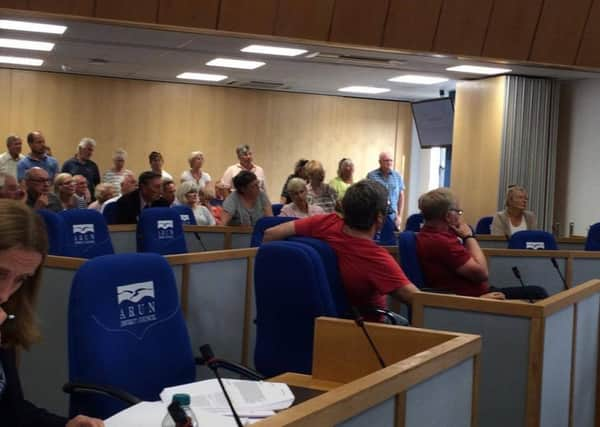COMMENT: Government to blame for hefty housing targets '“ but has lack of local scrutiny let residents down?


Following the decision by Arun District Council’s development control committee on Thursday (August 24), the Observer and Gazette have penned some thoughts:
FIVE THINGS WE LEARNED FROM CLIMPING HOMES REJECTION
1. People power can win


Strict planning laws normally rule the roost and councillors are often hamstrung by the views of other organisations.
Advertisement
Hide AdAdvertisement
Hide AdResidents regularly voice concerns around traffic and parking, yet rules followed by the highway authority West Sussex County Council often lead to it raising no objection.
If the county council, or other consultees raise no objection, it is extremely difficult for Arun to justify refusal of permission.
Yet in an unlikely boost for Climping villagers, councillors took the bold step of rejecting the plans on highways grounds - despite advice to the contrary. Given the site was included in the latest version of Arun’s local plan, rejection was doubly surprising.
Councillors should be praised for their bold and brave stance.
2. An appeal looms
Advertisement
Hide AdAdvertisement
Hide AdArun faces difficulties in defending its stance, should Mulgrave challenge the decision.
Full council approved the local plan to go forward for examination in March. It included a vision for 300 homes on the Climping site.
The reasons for Thursday’s refusal were technical matters – prematurity ahead of the local plan and highways issues. The refusal reasons do not attack the principle of development, so the local plan position remains unharmed.
But it remains to be seen whether those reasons will stand up to scrutiny.
Advertisement
Hide AdAdvertisement
Hide AdThe county council will, presumably, not have Arun’s back on highways matters, with no objection raised and contributions negotiated in excess of those envisaged in the local plan.
The unusual interjection of Karl Roberts was also telling. Canvassing for names of two councillors to attend an inquiry if a barrister refused to take the case was not standard protocol.
3. More scrutiny needed?
Arun’s local plan was approved for inspection by full council in March.
There was a air of discomfort in the chamber that evening, with many councillors clearly reluctant to support such high housing numbers. Some expressed the view there was little choice, given the plan’s well-documented history of troubles.
Advertisement
Hide AdAdvertisement
Hide AdBut the Climping decision perhaps highlighted how concerns over a lack of scrutiny were well founded.
Pouring over the various studies was the hugely-important job of the local plan sub-committee.
Meetings, however, often went by with little or no debate.
Would more scrutiny of the local plan at this stage highlighted the need to link development at Climping to Comet Corner improvements? The committee called for it - but it was not outlined in the plan.
Similarly, councillors Stephen Haymes and Philippa Bower, among 40 others mostly from the ruling Tory group, waved the plan through in March.
Advertisement
Hide AdAdvertisement
Hide AdOn Thursday, the duo voted for a refusal reason stating the scale of development was ‘inappropriate’.
The refusal reason was supported by Liberal Democrat Paul Wells but he voted against the plan in March. The reason was not carried – but had it been, councillors would have been questioning the plan itself.
With this in mind, we ask why councillors Haymes and Bower felt comfortable voting for the plan when they had concerns over the numbers.
*Councillor Ricky Bower, husband of Philippa Bower and chairman of the development control committee, has noted his wife was the only one to support the recommendation to approve the plans. She voted for the defeated refusal reason after the committee rejected the plans.
4. Agricultural land loss is finally on the radar
Advertisement
Hide AdAdvertisement
Hide AdArun relies on development of swathes of greenfield land to meet its tight housing targets.
Inevitably, this will result in the loss of Grade One agricultural land.
Councillor Barbara Oakley made a rousing speech expressing concerns on Thursday.
Among them was the worry about the loss of prime agricultural land.
Advertisement
Hide AdAdvertisement
Hide AdThe land debate has received little attention to date. With the plan at an advanced stage, we question if such concerns come too little, too late.
5. Time to lobby the Government?
The failure of the council to get a local plan in place has clearly had huge ramifications.
Developers are constantly winning the argument to build on land considered contrary to local planning policies because of Arun’s land supply issues.
Arun has faced stinging criticism from both residents and opposition councillors as a result.
Advertisement
Hide AdAdvertisement
Hide AdBut Arun is caught between a rock and a hard place, with the Government calling the shots and piling on the pressure for councils to accept huge housing targets.
Most will agree the housing targets for Sussex are unsustainable.
It therefore follows that lobbying MPs to alter planning laws must be the only option to ensure truly sustainable development of our beloved towns and villages.